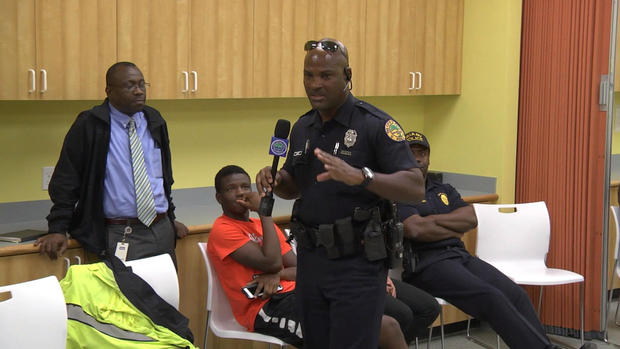Police revamp policies to change public perceptions
Overtown is one square mile in Miami of grinding poverty and crime. Its residents, mostly black, so distrust cops that they'll call them only when it's time to pick up a body.
"When you get a call in Overtown, you come prepared," said Officer Malcolm Moyse.
Overtown is Officer Moyse's beat. It's a tough place for a cop to build trust.
"Let me ask you something. What's your attitude towards cops today?" correspondent Mark Strassmann asked a resident.
"Today, really, I just decided to keep my distance to tell you the truth," the man said.
Moyse grew up in this neighborhood. He has spent the last two years trying to change Overtown's stereotypes about cops. Moyse will tell you, the key is getting out of his cruiser and talking to people.
"And the bottom line is you not gonna have a problem with me because I'm gonna treat you with respect and in return I'll always get respect back," Moyse said to the resident.
Distrust of cops here goes back years - with reason, according to the Department of Justice. In 2013, the DOJ issued a scathing review: Miami police had a "pattern or practice of excessive force" and "tactical and training deficiencies."
Rodolfo Llanes is the chief - and chief reformer - of the Miami-Dade Police.
"You can't change a culture in six months. It takes a long time ... some people cannot change that easily," he said.
When Chief Llanes swore in 25 new officers on Friday, he stressed the department's new approach: community-oriented policing.
"Every contact that you have, with someone you serve, strive for it to be a positive one," Llanes said at the ceremony.
"We can anticipate that there will be an ugly moment. And if we don't have that relationship before that, if you try to build them after you are way behind the 8 ball," Llanes told Strassmann.
Miami cops started meeting with local teens in a program called "Talk it Through."
When the teens were asked, "How many of you trust police officers, raise your hands?" not one hand went in the air.
"We look at you kids -- and we have a certain love, a natural love for you all -- that's why we do what we do. That's why we risk our lives and come out here to protect you all," Moyse told the group, choking up. "Because we want to make sure you all go home safe."
Moyse started a track and field team for Overtown kids 3 to 18. Ninety-five percent of them live below the poverty line.
Still, some residents resent anyone wearing blue. Lt. Joshua de la Milera knows a cop's race can feed distrust.
"That doesn't mean anything, because those very same people who might not like me because I'm white or this or that, I'm the avenging angel when it all goes down," he said.
Miami's trying other new ways to protect communities and cops. Like cops in Las Vegas, Miami cops now get trained in alternatives to deadly force. Police shootings in Vegas dropped from 25 in 2010 to 16 last year.
"You can do all of those things that you need to do, but in the end it's gonna be a behavioral reaction between two human beings. What that evolves to is impossible to predict," Chief Llanes said.
